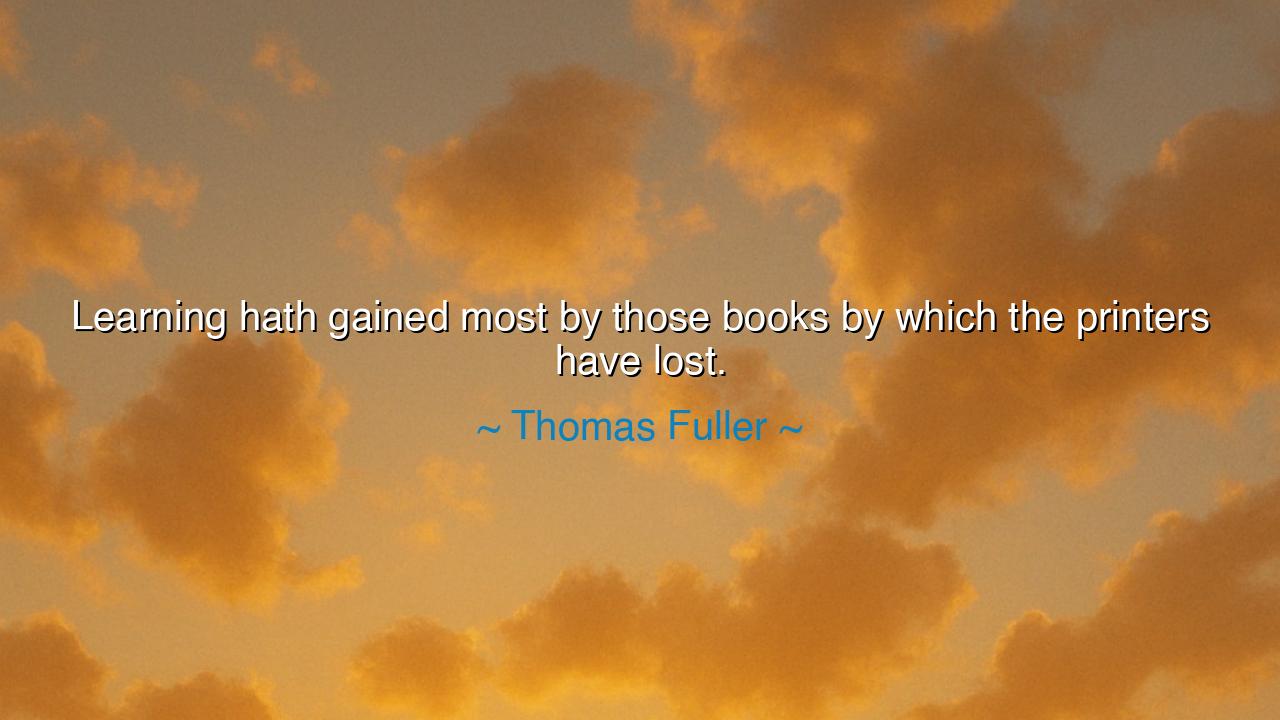
Learning hath gained most by those books by which the printers






When Thomas Fuller declared, “Learning hath gained most by those books by which the printers have lost,” he unveiled a truth as profound as it is paradoxical — that the greatest works of wisdom are not always those that bring profit, but those that enrich the human spirit. His words remind us that true learning does not spring from commerce, but from conviction; not from the marketplace, but from the mind and soul of the seeker. In an age when the printed word was both an art and a risk, Fuller’s observation stands as both praise and lament — praise for those who wrote and printed truth regardless of gain, and lament for a world that often fails to value the very works that elevate it.
The origin of this quote lies in Fuller’s experience as a 17th-century scholar, preacher, and historian during England’s turbulent civil and religious conflicts. Books then were not mere commodities; they were weapons of thought, often published at great personal peril. Printers risked not only their wealth but their liberty to print works of learning and conscience. Many of these books sold poorly — for wisdom is rarely fashionable — yet their influence grew beyond the reach of coins and markets. Fuller, with his characteristic wit and moral clarity, saw that the value of a book cannot be measured by its price, but by its power to awaken minds.
To the ancients, this truth would have been spoken as a law of virtue. The philosophers of Athens, who taught without fee, believed that wisdom is a divine fire, not a trade. Socrates wrote no books, yet his teachings kindled revolutions of thought that outlived empires. Likewise, many of history’s most sacred and transformative texts — the prophets’ scrolls, the manuscripts of saints, the treatises of visionaries — were born in obscurity and poverty. Their authors and publishers “lost,” as Fuller says, but learning gained — for every page sown in sacrifice bore fruit in eternity.
Consider the story of Nicolaus Copernicus, whose De revolutionibus orbium coelestium (On the Revolutions of the Heavenly Spheres) changed the very structure of the universe in human thought. The book brought neither wealth nor acclaim; indeed, it was published at the author’s death, and its printer faced suspicion and censorship. Yet that single work reoriented humanity’s place in creation — a perfect embodiment of Fuller’s insight. The printer may have “lost,” but knowledge gained a cosmos. It is the same with Galileo, whose writings were silenced by the Church yet illuminated the path of truth; and with countless unnamed printers and scribes who, across centuries, preserved learning through war, exile, and poverty.
Fuller’s statement also reflects the spiritual economy of wisdom — that the currency of the mind is not gold but understanding. Those who labor for truth often find no applause, yet they build the unseen foundations of progress. The printer who loses money on a masterpiece has, in truth, made the greatest investment of all: he has poured his livelihood into the enrichment of civilization. So too, the teacher who earns little yet ignites a mind, or the artist whose work is unbought yet enduring — all share in this sacred pattern of loss that is secretly gain.
In his age, Fuller warned against material blindness — the tendency to measure success by profit rather than purpose. His wisdom applies no less today. In a world that prizes the bestseller over the timeless, the viral over the virtuous, we must remember that the worth of knowledge cannot be weighed in silver. The truest books — those that stir conscience, awaken justice, or nourish the soul — often bring their makers little more than obscurity or debt. Yet it is by these very losses that learning advances, for truth travels not on the wings of wealth, but on the endurance of those who believe in it.
The lesson, then, is this: seek the treasures that do not tarnish. Read not only what sells, but what endures. Support not only what entertains, but what enlightens. And if ever you labor for knowledge, for art, or for the good of others, do not measure your reward by gain, but by growth — by how much truth and beauty you have added to the world.
So let these words of Thomas Fuller endure as a blessing for all who walk the scholar’s path: To lose in gold is nothing if one gains in wisdom. For every book that fails in the market but succeeds in the soul, every teacher unpaid yet unforgotten, every thinker mocked yet immortal — these are the true victories of learning. And though the printers of such books may lose their silver, the world gains its light.






AAdministratorAdministrator
Welcome, honored guests. Please leave a comment, we will respond soon